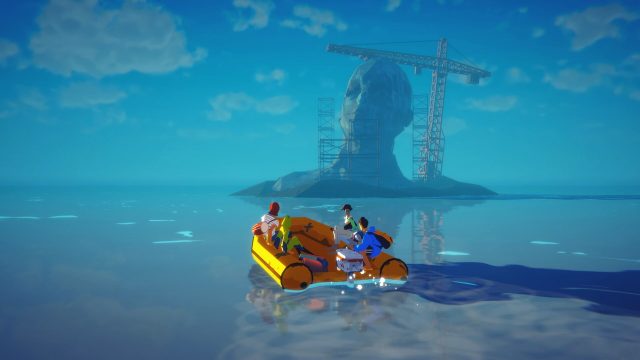Visual elements and world building are well executed; Great soundtrack; Combat is fun and challenging, especially the environmental kills
Jarring transitions between battles, scenes, etc.; Story pacing gets lost as the game progresses; Minimalistic UI can lead to confusion
Developed by Demagog Studio, Highwater is a story-driven adventure game set in a flooded post-apocalyptic world that features isometric turn-based combat. You follow the story of teenage survivor Nikos, who wants to escape from the flooded world to Mars by stowing away on a rocket set to launch with only the rich and elite as passengers. As you traverse the flooded wasteland via motorboat, you will scavenge useful items, discover the lore of the game’s world through collectibles and listening to radio broadcasts, and make friends or foes of other survivors.
The world-building of Highwater is well-executed in that the game doesn’t give all the details to the player right away, leaving room for exploration of the game’s world. The game begins with exposition explaining that a major ecological catastrophe has caused the world to flood and also speaks of the conflicts between the factions that exist in it. The three main factions of the game are the Alphavillians— the wealthy and technologically advanced elite of Alphaville who are planning to send a rocket to Mars, the Insurgents— violent and armed pirates who have no qualms murdering to get what they want, and the residents of Highwater— people just trying to survive. There are other smaller factions, like a cult that worships trains that you encounter while playing the game, but don’t play a major role in the story.
Despite a strong start, the game does lose some pacing with its storyline. While playing the game you will encounter several characters with unique abilities that join Nikos on his journey throughout the flooded wasteland, however it is unclear when said characters will leave your party as the story progresses. There are segments of the game where I was confused about where certain party members went and then they would show up later in another battle with not much fanfare. The game also has jarring transitions between scenes, such as jumping to a conversation in a different location shortly after a battle or jumping to another set of characters without letting me know I was controlling them (as Nikos wasn’t with them).
The gameplay of Highwater consists mainly of traveling by boat to stop at points-of-interest and turn-based combat. The boat controls were not disclosed when I first started the game (you control Nikos’ boat acceleration using the left and right triggers, the left thumbstick for steering, and the right thumbstick for camera controls) and I didn’t notice the HUD in the bottom-right corner right away due to its minimalist design. It’s a white ring with a hardly noticeable dot for the next closest objective, leaving me lost as to where to go next. When you stop at points-of-interest, you switch to an isometric view where you are able to talk with NPCs and interact with sparkling objects to find items and collectibles. The items you can find are usually key items for the story, consumable buffs for combat, and weapons for your characters.
The combat system is where the gameplay shines the best though, as the turn-based combat functions akin to that of games like Fire Emblem and XCOM. You can use the environment as cover, weapons, or obstacles to your advantage against your enemies— I particularly found using Niko’s fishing rod to yank enemies into water or drops to be the most satisfying to pull off. At first I thought if a character I controlled died, they’d be gone at the end of the battle, but I was surprised to learn that it didn’t matter if all but one character was left alive, as all of Nikos’ party would be fine as long as the battle was won. It’s also worth noting that every battle sees all characters start with full health. Learning this did change how I saw each battle, making the stakes a little less exciting as I had expected to get a game over especially when Nikos was killed. Despite that revelation, the challenge of Highwater‘s combat is exciting nevertheless.
The game does have a lovely low-poly art style that lends itself well to the game’s theme of a flooded world. The sun’s reflection on the horizon and the bright colors of the greenery creates a relaxing atmosphere in the otherwise bleak setting of the tops of city buildings jutting out from beneath the water’s surface. The characters are visually distinct from one another against the prominently green and gray environmental palette and the soundtrack also complements the game’s art style with diverse music that adapts to the situation, whether it be combat, travel, or cutscenes.
From my overall experience playing Highwater, it’s a game with good visuals, music, and world-building, but suffers from jarring transitions and rough story pacing as the game progresses. The most fun to be had in Highwater would have to be the challenge and creativity of its combat mechanics— interacting with the environment can lead to satisfying and sometimes hilarious ways to defeat enemies.
Nintendojo was provided a copy of this game for review by a third party, though that does not affect our recommendation. For every review, Nintendojo uses a standard criteria.




 ShareThis
ShareThis






